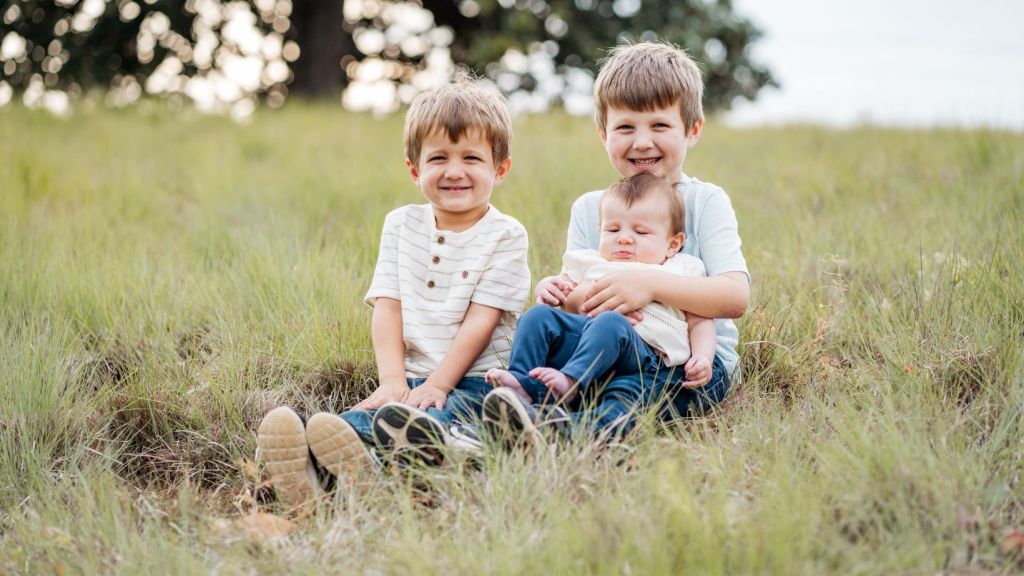Do you ever find yourself in the midst of sibling conflict, wondering how to guide your children through the chaos? Conflict between siblings is a normal part of family life, but it’s crucial to teach them how to handle it in a biblical, constructive way. I’m going to share a simple yet effective process that can help your kids process and resolve conflicts while also imparting valuable lessons rooted in Christian values.
First let’s make a list of a few reasons behind sibling conflict…
- Sharing Disputes: Conflicts often arise when siblings disagree over the use of toys, possessions, or personal space.
- Age and Developmental Differences: Siblings of different ages and developmental stages may have different interests and abilities, leading to conflicts.
- Personality Clashes: Differences in personalities, temperaments, and interests can result in clashes.
- Protecting Self-Esteem: Siblings may fight when they feel their self-esteem is threatened or criticized.
- Boredom or Lack of Activities: When there’s nothing to do, children may turn to conflicts as a source of entertainment.
- Revenge: Siblings sometimes resort to fighting as a form of retaliation for past grievances.
- Copying or Imitation: Younger siblings may imitate the behaviors of older ones, leading to conflicts.
- Feeling Unheard: Siblings might fight when they feel their opinions, needs, or feelings are not being considered.
- Perceived Injustice: Siblings may engage in conflicts if they feel something unfair has happened to them.
- Lack of Communication Skills: Children may not have the communication skills to express their feelings and needs, leading to conflicts as an outlet.








Now let’s take a look at a biblical process to help siblings resolve conflict using these questions:
1. What did you do that was wrong?
Conflict often arises from actions that cross boundaries. The first step in resolving sibling disputes is to have each child reflect on their actions and admit what they did wrong. This is not about assigning blame but understanding the situation objectively. Because when doing so, children have the opportunity to confront their own actions and attitudes as the initial source of the conflict. They get to learn to recognize their own shortcomings and sinful behaviors, allowing them to take ownership of their mistakes. This self-awareness is a fundamental aspect of Christianity, where acknowledging one’s sinful nature is the first step towards seeking God’s forgiveness and grace.
2. Why did you do it?
Understanding the motives behind their actions is the next crucial step. Our primary aim is to guide our children in delving deep into the root of their sinful behavior. We believe that by addressing the underlying issues that lead to their wrong actions, we can effectively teach them the values of discerning what needs to be put off, like selfishness and pride, and what should be put on, like thoughtfulness and humility, in their lives.
3. Why was it wrong?
Once they’ve identified their actions and motives, guide them in recognizing why what they did was wrong. Help them to acknowledge that their behavior did not honor God because it did not reflect God’s love, grace, and righteousness. Remind them that we show honor to God by loving God and obeying what he commands. Then emphasize that the behavior did not honor one’s sibling because they did not treat them with kindness, compassion, or respect. We do this to help our children see that their sinful actions, such as aggression or mistreatment, not only violate the trust and love between siblings but also run contrary to the teachings of Christ, who emphasized loving one another as oneself.
4. What can you do now to try to repair the wrong you did?
Taking responsibility for one’s actions and making amends is a vital step. When you’ve done something wrong, it’s crucial to initiate the process of reconciliation by offering a heartfelt apology. This step involves recognizing the hurt or harm caused, taking ownership of one’s actions, and expressing remorse. Apologizing is not merely a formality but a profound act of humility, vulnerability, and accountability. It communicates that you understand the gravity of your actions and are genuinely sorry.
However, when striving to make things right, it’s important to recognize that it doesn’t end with an apology. Seeking God’s guidance and assistance is a crucial component of personal growth and transformation. Here you want to teach your child to pray to ask God for strength, wisdom, and grace to resist temptation and avoid repeating the same wrongdoing.
This conflict resolution process is about more than just resolving disputes; it’s about instilling Christian values, fostering character development, and nurturing spiritual growth. It’s an investment in our children’s future, teaching them how to navigate life’s challenges with grace, humility, and Christ-like love.
Latest Posts:
- How To Memorize Scripture With Toddlers
- FREEBIE: 28-Day Simple Family Faith Discipleship Challenge
- Signs You are Growing as a Christian Mom
- 6 Things to Know About God as a Christian Mom
- Stocking Stuffer Gift Guide
- Holiday Gift Guides
- When and How You Read the Bible is Your Unique Journey
- Helping Kids Understand Emotions Using the Bible
- The Magic of Our Homeschool Room Window Bird Feeder
- The Power of Praying Together

Leave a comment